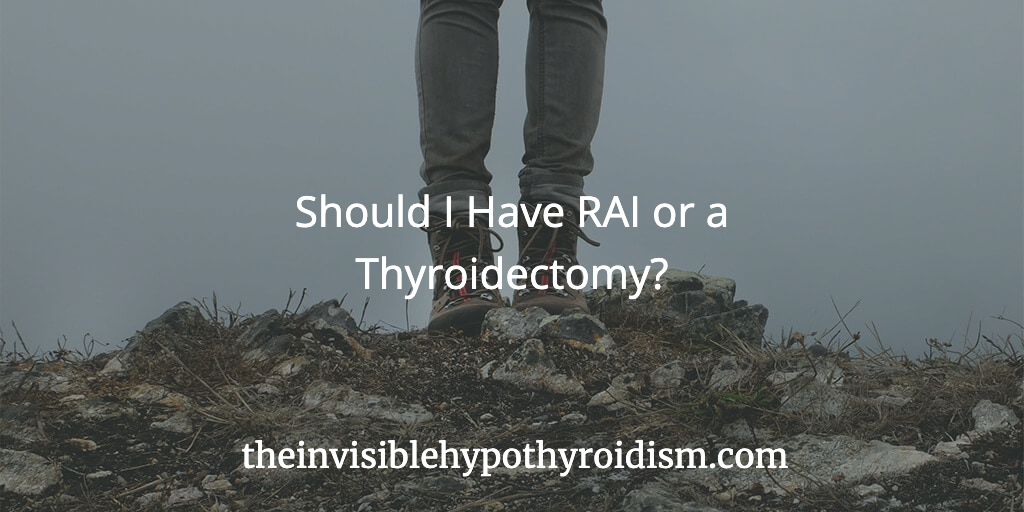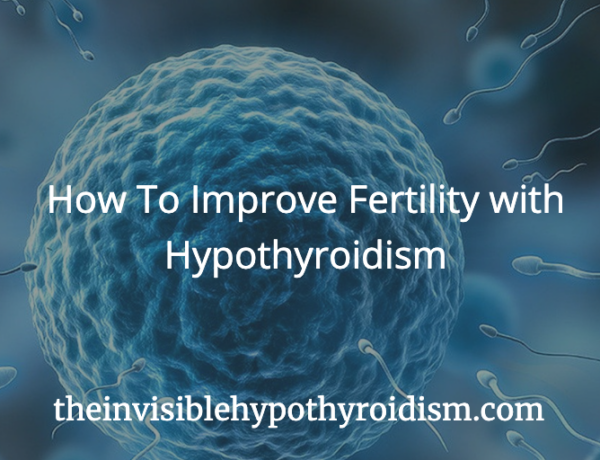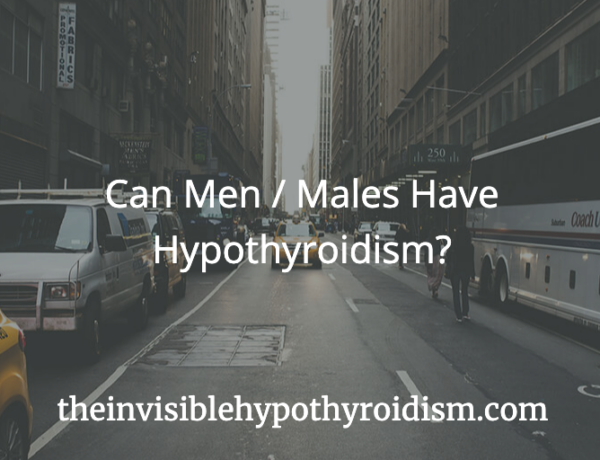Originally published on 16th April 2020 Last updated on 2nd August 2024
For those with a form of overactive thyroid disease, such as Graves’, hyperthyroidism and Hashitoxicosis, they may be offered RAI (Radioactive Iodine Treatment) or a Thyroidectomy (surgical removal of the thyroid gland) as treatment options.
Both of these usually result in the patient becoming permanently hypothyroid, but if you’re facing these treatment options, how do you know which one to opt for?
Do you choose to live with, essentially, a disabled organ inside of you, or do you remove it from the body completely?
Thinking About RAI
What is RAI?
Radioactive Iodine Treatment, also often called Radioactive Iodine Therapy, RAI, RI or remnant ablation, is an effective way to kill off thyroid tissue. It can be used on its own or in conjunction with a thyroidectomy.
Usually taken via a ‘drink’ or tablet, radioactive iodine is taken up by the thyroid and destroys thyroid cells. This effectively reduces the amount of thyroid hormone made by the gland and usually, to the point of disabling it altogether.
Radioactive iodine treatment is not usually given to:
- Pregnant women
- Breastfeeding women
- Anyone who is regularly vomiting or incontinent
- Those with thyroid eye disease, as it may worsen this
Things To Consider About RAI:
- After radioactive iodine treatment, patients have to stay in isolation for a few days, until the radioactivity has left the body. This is to protect others so that they are not exposed to the radiation. Needing to stay in hospital and away from family (particularly young children) may affect your decision about whether to opt for RAI.
- RAI usually works on first attempt, but it has been known to take a second or third attempt on some individuals. If thyroid tissue ‘reactivates’ following RAI, you may need to do it more than once.
- Some people will question putting this chemical in to their bodies and have natural concerns surrounding side effects and other risk factors.
- There is a small risk of developing cancer from treatment of RAI, but for most people the benefit of treating with RAI outweighs the low cancer risk. [1]
- Those with thyroid eye disease or other eye muscle issues may risk worsening their eye conditions and even blindness, with RAI.
- Following RAI, it may take a while for your thyroid hormone levels to drop and you may gradually feel more and more unwell until a diagnosis of hypothyroidism is made.
- RAI can have side effects such as gastrointestinal complaints, swollen salivary glands and insufficient salivary production.
- Following RAI, men are advised to avoid fathering a child for at least four months, and women advised to avoid conceiving for at least six months. [1]
Thinking About a Thyroidectomy
What is a Thyroidectomy?
A thyroidectomy is the surgical removal of the thyroid gland and most often involves the total removal of the gland. It can be used on its own or in conjunction with RAI.
A thyroidectomy typically takes a few hours to perform and is usually straight forward. You may need to stay a night or two in hospital, however. Thyroid surgery is most commonly performed with general anaesthesia.
Post surgery, you will be left with a 3-5 inch scar that should become less noticeable over time. You may notice some swelling or bruising around your incision, and this is expected. You may experience some short-term pain and neck stiffness after surgery.
You’ll be expected to need one to two weeks to recuperate after the surgery, with time off work.
See a whole article on what to expect from a thyroidectomy here.
Things To Consider About a Thyroidectomy:
- This surgery is obviously very final and non-reversible.
- Opting for a thyroidectomy does mean that antibodies targeted towards the thyroid gland drop after the removal of the gland.
- The risk of paralysis to the vocal cords and the surrounding areas of the thyroid gland is present. E.g. the laryngeal nerve and parathyroid glands.
- However, with a thyroidectomy, thyroid function is swiftly removed and you may be started on treatment for hypothyroidism fairly soon after (compared to RAI).
- When it comes to thyroid cancer, a total thyroidectomy may provide the most peace of mind, though this is often followed up with RAI treatment too.
Considerations for Both RAI and a Thyroidectomy
It is worth knowing that both of the above treatment methods do not actually address the root cause of the condition or take a holistic approach to your thyroid disease (overactive thyroid disease, such as Graves’, hyperthyroidism and Hashitoxicosis etc.)
Often, a compromised immune system is involved with Hashimoto’s and Graves’ and removing or ablating the thyroid gland doesn’t address this. The antibodies do tend to drop as the immune system has no tissue left to target, but the inflammation often goes unaddressed. This is where it can be useful to look at other ways to address thyroid issues more holistically.
Both treatments have been associated with developing adrenal dysfunction afterwards, which often goes hand in hand with hypothyroidism also.
It is also important to understand that after either of these treatments, you will require thyroid hormone replacement medication for life, in order to treat the resulting hypothyroidism. Understanding this form of thyroid condition and what it can entail is crucial.
Have you had to make this decision? Feel free to share your experiences in the comments below.
References:
[1] https://www.btf-thyroid.org/treatment-of-an-over-active-or-enlarged-thyroid-gland-with-radioactive-iodine





